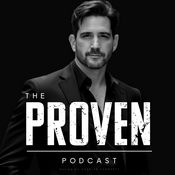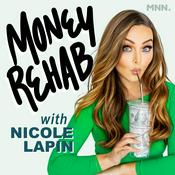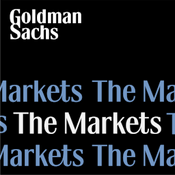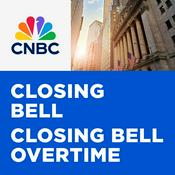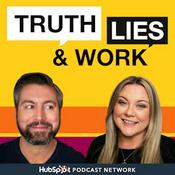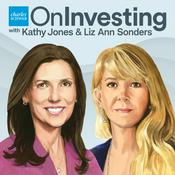34 episodes
- The barrage of unsettling headlines has investors wondering how to manage their investments amid ongoing changes and disruptions coming from Washington. On this episode of WashingtonWise, Kasey McCurdy, chief portfolio strategist at Schwab Wealth Advisory, joins host Mike Townsend to tackle the turbulent start to the year. Kasey shares insights on how investors can tune out the noise when making investment decisions, even when there are few historical comparisons, and offers strategies for building resilient portfolios amidst uncertainty, both geopolitical and domestic. Mike also provides insights on what's happening in Washington right now, including the risk of a second government shutdown, the latest from the Federal Reserve, and the challenges the White House is facing on affordability issues.
WashingtonWise is an original podcast for investors from Charles Schwab. For more on the series, visit schwab.com/WashingtonWise.
If you enjoy the show, please leave a ★★★★★ rating or review on Apple Podcasts
IMPORTANT DISCLOSURES
The policy analysis provided by the Charles Schwab & Co., Inc., does not constitute and should not be interpreted as an endorsement of any political party.
This material is intended for general informational and educational purposes only. This should not be considered an individualized recommendation or personalized investment advice. The investment strategies mentioned are not suitable for everyone. Each investor needs to review an investment strategy for his or her own particular situation before making any investment decisions.
All expressions of opinion are subject to change without notice in reaction to shifting market, economic or political conditions. Data contained herein from third party providers is obtained from what are considered reliable sources. However, its accuracy, completeness or reliability cannot be guaranteed.
Past performance is no guarantee of future results.
Investing involves risk, including loss of principal.
All names and market data shown are for illustrative purposes only and are not a recommendation, offer to sell, or a solicitation of an offer to buy any security.
Diversification, asset allocation and rebalancing strategies do not ensure a profit and do not protect against losses in declining markets.
Rebalancing may cause investors to incur transaction costs and, when a non-retirement account is rebalanced, taxable events may be created that may affect your tax liability.
Performance may be affected by risks associated with non-diversification, including investments in specific countries or sectors. Additional risks may also include, but are not limited to, investments in foreign securities, especially emerging markets, real estate investment trusts (REITs), fixed income, municipal securities including state specific municipal securities, small capitalization securities and commodities. Each individual investor should consider these risks carefully before investing in a particular security or strategy.
International investments involve additional risks, which include differences in financial accounting standards, currency fluctuations, geopolitical risk, foreign taxes and regulations, and the potential for illiquid markets.
High-yield securities and unrated securities of similar credit quality (junk bonds) are subject to greater levels of credit and liquidity risks and may be more volatile than higher-rated securities
Preferred securities are a type of hybrid investment that share characteristics of both stock and bonds. They are often callable, meaning the issuing company may redeem the security at a certain price after a certain date. Such call features, and the timing of a call, may affect the security’s yield. Preferred securities generally have lower credit ratings and a lower claim to assets than the issuer's individual bonds. Like bonds, prices of preferred securities tend to move inversely with interest rates, so their prices may fall during periods of rising interest rates. Investment value will fluctuate, and preferred securities, when sold before maturity, may be worth more or less than original cost. Preferred securities are subject to various other risks including changes in interest rates and credit quality, default risks, market valuations, liquidity, prepayments, early redemption, deferral risk, corporate events, tax ramifications, and other factors.
Forecasts contained herein are for illustrative purposes only, may be based upon proprietary research and are developed through analysis of historical public data.
Currency trading is speculative, very volatile and not suitable for all investors
Indexes are unmanaged, do not incur management fees, costs, and expenses (and/or "transaction fees or other related expenses"), and cannot be invested in directly. For more information on indexes, please see schwab.com/indexdefinitions
The Schwab Center for Financial Research is a division of Charles Schwab & Co., Inc.
The Charles Schwab Corporation provides a full range of brokerage and financial advisory services through its operating subsidiaries. Its broker-dealer subsidiary, Charles Schwab & Co., Inc. (Member SIPC [link to: https://www.sipc.org/] offers investment services and products, including Schwab brokerage accounts.
0126-4SFT
Hosted by Simplecast, an AdsWizz company. See pcm.adswizz.com for information about our collection and use of personal data for advertising. - Policy and politics are likely to have an outsized impact on the markets in 2026 as the administration, Congress, and the courts seek to shape the policy landscape in advance of the midterm elections. In this episode of WashingtonWise, host Mike Townsend focuses on six issues that could directly impact investors in the year ahead, including Federal Reserve independence, geopolitical events like the U.S. military operation in Venezuela, and key debates in Congress around health care policy, government funding, and cryptocurrency regulation. And he discusses the impact to investors' portfolios and the markets in general that proposed rules from regulatory agencies like the SEC, CFTC, and Labor Department could bring. With additional insights on pivotal Supreme Court cases and the implications of the upcoming midterm elections, Mike emphasizes the podcast's mission to help investors cut through political and economic noise, providing clear, fact-based analysis to better understand what truly matters for markets and your investments.
WashingtonWise is an original podcast for investors from Charles Schwab. For more on the series, visit schwab.com/WashingtonWise.
If you enjoy the show, please leave a ★★★★★ rating or review on Apple Podcasts.
IMPORTANT DISCLOSURES
The policy analysis provided by the Charles Schwab & Co., Inc., does not constitute and should not be interpreted as an endorsement of any political party.
This material is intended for general informational and educational purposes only. This should not be considered an individualized recommendation or personalized investment advice. The investment strategies mentioned are not suitable for everyone. Each investor needs to review an investment strategy for his or her own particular situation before making any investment decisions.
All expressions of opinion are subject to change without notice in reaction to shifting market, economic or political conditions. Data contained herein from third party providers is obtained from what are considered reliable sources. However, its accuracy, completeness or reliability cannot be guaranteed.
Past performance is no guarantee of future results.
Investing involves risk, including loss of principal.
All names and market data shown are for illustrative purposes only and are not a recommendation, offer to sell, or a solicitation of an offer to buy any security.
Performance may be affected by risks associated with non-diversification, including investments in specific countries or sectors. Additional risks may also include, but are not limited to, investments in foreign securities, especially emerging markets, real estate investment trusts (REITs), fixed income, municipal securities including state specific municipal securities, small capitalization securities and commodities. Each individual investor should consider these risks carefully before investing in a particular security or strategy.
Currency trading is speculative, very volatile and not suitable for all investors
Cryptocurrency-related products carry a substantial level of risk and are not suitable for all investors. Investments in cryptocurrencies are relatively new, highly speculative, and may be subject to extreme price volatility, illiquidity, and increased risk of loss, including your entire investment in the fund. Spot markets on which cryptocurrencies trade are relatively new and largely unregulated, and therefore, may be more exposed to fraud and security breaches than established, regulated exchanges for other financial assets or instruments. Some cryptocurrency-related products use futures contracts to attempt to duplicate the performance of an investment in cryptocurrency, which may result in unpredictable pricing, higher transaction costs, and performance that fails to track the price of the reference cryptocurrency as intended.
Futures and futures options trading involves substantial risk and is not suitable for all investors. Please read the Risk Disclosure Statement for Futures and Options, https://www.schwab.com/Futures_RiskDisclosure] prior to trading futures products.
The Charles Schwab Corporation provides a full range of brokerage and financial advisory services through its operating subsidiaries. Its broker-dealer subsidiary, Charles Schwab & Co., Inc. (Member SIPC [link to: https://www.sipc.org/] offers investment services and products, including Schwab brokerage accounts.
0126-UFXB
Hosted by Simplecast, an AdsWizz company. See pcm.adswizz.com for information about our collection and use of personal data for advertising. - Affordability is the political buzzword of the moment, contributing to a widening gap between what consumers and investors think about the economy versus how the economy is actually performing. In this episode, Kevin Gordon, head of macro research and strategy at the Schwab Center for Financial Research, joins host Mike Townsend to discuss how affordability, though difficult to define, is shaping consumer sentiment and policy debates, especially as economic data and public perception diverge. Kevin shares his perspective on the softening jobs market, sticky inflation, the accuracy of government data, the deep divisions at the Federal Reserve, and how tariffs will continue to be a major issue for investors to watch. He also discusses his 2026 Market Outlook, highlighting potential opportunities for investors in the coming year even as concerns increase about the sustainability of the bull market.
And Mike shares his thoughts on another looming government shutdown deadline, the battle on Capitol Hill over health care subsidies, and why a Republican victory in a recent special election is signaling that Republicans may be in for a rough ride in next year's midterms.
Check out Schwab's 2026 Outlook: U.S. Stocks and Economy.
WashingtonWise is an original podcast for investors from Charles Schwab. For more on the series, visit schwab.com/WashingtonWise.
If you enjoy the show, please leave a ★★★★★ rating or review on Apple Podcasts
IMPORTANT DISCLOSURES
The policy analysis provided by the Charles Schwab & Co., Inc., does not constitute and should not be interpreted as an endorsement of any political party.
This material is intended for general informational and educational purposes only. This should not be considered an individualized recommendation or personalized investment advice. The investment strategies mentioned may not be suitable for everyone. Each investor needs to review an investment strategy for his or her own particular situation before making any investment decisions.
All expressions of opinion are subject to change without notice in reaction to shifting market, economic or political conditions. Data contained herein from third party providers is obtained from what are considered reliable sources. However, its accuracy, completeness or reliability cannot be guaranteed.
Past performance is no guarantee of future results.
Investing involves risk, including loss of principal.
All names and market data shown are for illustrative purposes only and are not a recommendation, offer to sell, or a solicitation of an offer to buy any security.
Forecasts contained herein are for illustrative purposes only, may be based upon proprietary research and are developed through analysis of historical public data.
This information is not intended to be a substitute for specific individualized tax, legal, or investment planning advice. Where specific advice is necessary or appropriate, you should consult with a qualified tax advisor, CPA, Financial Planner, or Investment Manager.
Small cap investments are subject to greater volatility than those in other asset categories.
Indexes are unmanaged, do not incur management fees, costs, and expenses (and/or "transaction fees or other related expenses"), and cannot be invested in directly. For more information on indexes, please see schwab.com/indexdefinitions
The Schwab Center for Financial Research is a division of Charles Schwab & Co., Inc.
1225-KM4Z
Hosted by Simplecast, an AdsWizz company. See pcm.adswizz.com for information about our collection and use of personal data for advertising. - The longest government shutdown in U.S. history may be over, but Washington now finds itself facing several tough issues that will have significant implications for the markets and the economy. In this episode of WashingtonWise, host Mike Townsend examines the fallout from the shutdown, including the risk of another shutdown in early 2026, how the lack of government economic data could impact the Fed's December decision on rate cuts, and how the ongoing debate over health care subsidies remains unresolved. He discusses why investors should keep an eye on two critical Supreme Court cases—one on the legality of much of President Trump's tariff policies and one that goes at the heart of Fed independence. He also shares his perspective on the 2025 elections, what they may signal for the 2026 midterms, and why more lawmakers than usual are calling it quits rather than running for re-election. Finally, Mike explores how the end of penny production after more than 230 years could be tricky for retailers and banks.
WashingtonWise is an original podcast for investors from Charles Schwab. For more on the series, visit schwab.com/WashingtonWise.
If you enjoy the show, please leave a ★★★★★ rating or review on Apple Podcasts.
IMPORTANT DISCLOSURES
The policy analysis provided by the Charles Schwab & Co., Inc., does not constitute and should not be interpreted as an endorsement of any political party.
This material is intended for general informational and educational purposes only. This should not be considered an individualized recommendation or personalized investment advice. The investment strategies mentioned may not be suitable for everyone. Each investor needs to review an investment strategy for his or her own particular situation before making any investment decisions.
All expressions of opinion are subject to change without notice in reaction to shifting market, economic or political conditions. Data contained herein from third party providers is obtained from what are considered reliable sources. However, its accuracy, completeness or reliability cannot be guaranteed.
Past performance is no guarantee of future results.
Investing involves risk, including loss of principal.
The Charles Schwab Corporation provides a full range of brokerage and financial advisory services through its operating subsidiaries. Its broker-dealer subsidiary, Charles Schwab & Co., Inc. (Member SIPC [link to: https://www.sipc.org/] offers investment services and products, including Schwab brokerage accounts.
1125-CM2C
Hosted by Simplecast, an AdsWizz company. See pcm.adswizz.com for information about our collection and use of personal data for advertising. - With the Fed cutting rates and the bull market in stocks continuing its run of more than three years, some investors are wondering whether bonds still play an important role in a portfolio. On this episode, host Mike Townsend and guest Collin Martin, managing director and head of fixed income research and strategy at Schwab, discuss why bonds still matter when it comes to providing stability in a diversified portfolio. Collin shares his perspective on how mortgage-backed securities, international bonds, and Treasury Inflation-Protected Securities (TIPS) all merit consideration by fixed income investors. They also do a deep dive into the most recent Fed meeting, including how the Fed is navigating the lack of economic data during the government shutdown, how it is wrestling with contradictory pressures from the jobs market and inflation, and the relationship between the fed funds rate and mortgage rates. Mike also provides updates on the government shutdown and how the Supreme Court is poised for a landmark decision on the president's tariff policy.
WashingtonWise is an original podcast for investors from Charles Schwab. For more on the series, visit schwab.com/WashingtonWise.
If you enjoy the show, please leave a ★★★★★ rating or review on Apple Podcasts.
IMPORTANT DISCLOSURES
The policy analysis provided by the Charles Schwab & Co., Inc., does not constitute and should not be interpreted as an endorsement of any political party.
This material is intended for general informational and educational purposes only. This should not be considered an individualized recommendation or personalized investment advice. The investment strategies mentioned may not be suitable for everyone. Each investor needs to review an investment strategy for his or her own particular situation before making any investment decisions.
All expressions of opinion are subject to change without notice in reaction to shifting market, economic or political conditions. Data contained herein from third party providers is obtained from what are considered reliable sources. However, its accuracy, completeness or reliability cannot be guaranteed.
Past performance is no guarantee of future results.
Investing involves risk, including loss of principal.
All names and market data shown are for illustrative purposes only and are not a recommendation, offer to sell, or a solicitation of an offer to buy any security.
International investments involve additional risks, which include differences in financial accounting standards, currency fluctuations, geopolitical risk, foreign taxes and regulations, and the potential for illiquid markets. Investing in emerging markets may accentuate these risks.
Fixed income securities are subject to increased loss of principal during periods of rising interest rates. Fixed income investments are subject to various other risks, including changes in credit quality, market valuations, liquidity, prepayments, early redemption, corporate events, tax ramifications, and other factors.
Lower rated securities are subject to greater credit risk, default risk, and liquidity risk.
Diversification and asset allocation strategies do not ensure a profit and do not protect against losses in declining markets.
Mortgage-backed securities (MBS) may be more sensitive to interest rate changes than other fixed income investments. They are subject to extension risk, where borrowers extend the duration of their mortgages as interest rates rise, and prepayment risk, where borrowers pay off their mortgages earlier as interest rates fall. These risks may reduce returns.
Treasury Inflation Protected Securities (TIPS) are inflation-linked securities issued by the US Government whose principal value is adjusted periodically in accordance with the rise and fall in the inflation rate. Thus, the dividend amount payable is also impacted by variations in the inflation rate, as it is based upon the principal value of the bond. It may fluctuate up or down. Repayment at maturity is guaranteed by the US Government and may be adjusted for inflation to become the greater of the original face amount at issuance or that face amount plus an adjustment for inflation. Treasury Inflation-Protected Securities are guaranteed by the US Government, but inflation-protected bond funds do not provide such a guarantee.
This information is not intended to be a substitute for specific individualized tax, legal, or investment planning advice. Where specific advice is necessary or appropriate, you should consult with a qualified tax advisor, CPA, Financial Planner, or Investment Manager.
Indexes are unmanaged, do not incur management fees, costs, and expenses (and/or "transaction fees or other related expenses"), and cannot be invested in directly. For more information on indexes, please see schwab.com/indexdefinitions
Currency trading is speculative, very volatile and not suitable for all investors.
The Schwab Center for Financial Research is a division of Charles Schwab & Co., Inc.
1125-6R2W
Hosted by Simplecast, an AdsWizz company. See pcm.adswizz.com for information about our collection and use of personal data for advertising.
More Business podcasts
Trending Business podcasts
About WashingtonWise
Our finances, portfolios and the markets are affected daily by the policies and politics coming out of Washington. In each episode of WashingtonWise, host Mike Townsend, Charles Schwab’s Vice President for Legislative and Regulatory Affairs, focuses a non-partisan eye on the stories that matter most to investors, and his guests offer actionable suggestions for what to do--and what not to do--with your portfolio.
Podcasts are for informational purposes only. This channel is not monitored by Charles Schwab. Please visit schwab.com/contactus for contact options.
Podcast websiteListen to WashingtonWise, The Learning Leader Show With Ryan Hawk and many other podcasts from around the world with the radio.net app

Get the free radio.net app
- Stations and podcasts to bookmark
- Stream via Wi-Fi or Bluetooth
- Supports Carplay & Android Auto
- Many other app features
Get the free radio.net app
- Stations and podcasts to bookmark
- Stream via Wi-Fi or Bluetooth
- Supports Carplay & Android Auto
- Many other app features


WashingtonWise
Scan code,
download the app,
start listening.
download the app,
start listening.






